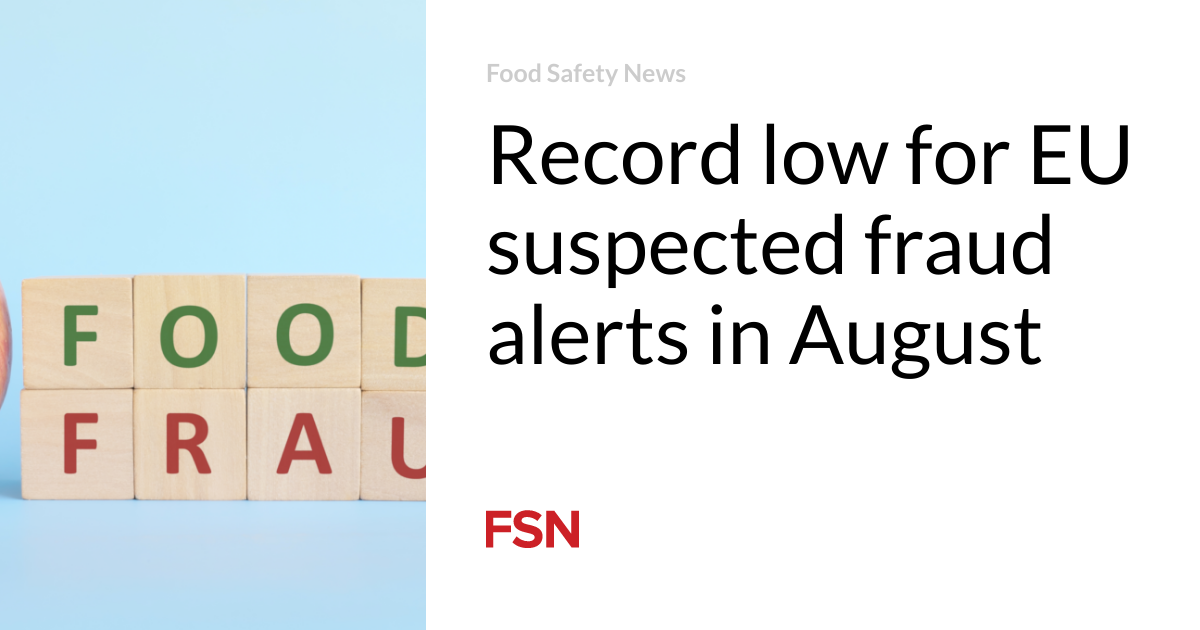Fraud and non-compliance considerations mentioned in August by European countries were at their lowest stage since reporting began in early 2024.
The preference of food and different fraud suspicions raised by EU member states declined in August. The 222 alerts are down from 325 in July, 265 in June, 281 in Also can simply, 341 in April, 345 in March, and 318 in February. There were 277 in January.
The considerations listed are likely frauds. Non-compliance could suggested investigations by authorities in EU member states. Critical points come from a monthly document printed by the European Payment.
Information includes suspected detrimental-border fraud matters shared between contributors of the Alert and Cooperation Community (ACN) and retrieved from the Speedy Alert Blueprint for Food and Feed (RASFF), Administrative Assistance and Cooperation Community (AAC) and the Agri-Food Fraud Community (FFN).
It covers food, animal feed, food contact affords, animal welfare for farmed animals, plant protection merchandise, and veterinary medicine merchandise that finish up as residues and contaminants in food and feed.
The targets are to assist nationwide authorities in setting up risk-based controls to fight fraudulent and deceptive practices, aid the food sector with vulnerability assessments, and name emerging risks.
A total of 46 notices mentioned fruit and greens, with the bulk being non-compliant resulting from pesticide residues. Dietetic foods, supplements, and fortified foods ranked second with 37 alerts. Herbs and spices climbed to third, while cereals and bakery merchandise dropped to fourth.
The massive majority of considerations were uncovered by strategy of border inspections or market controls. In total, 16 were chanced on after particular person complaints and 24 after a firm’s internal test.
Examples of reported considerations
In August, six alerts involved the United States. They included cheese sauce missing border controls, sunset yellow in snacks, traceability considerations with lobsters, and ingredients in supplements no longer allowed in Europe.
Product tampering instances included cow’s milk in a sheep cheese from Italy, ethylene oxide in herbs and spices from India, Sudan dyes in curry powder from Turkey, recent beef merchandise illegally frozen with an prolonged finest-before date from Uruguay, and sale of salami from Italy that changed into as soon as unfit for consumption resulting from yeasts and mildew.
Record tampering incidents featured counterfeit coffee from the Czech Republic, two readable microchips on a horse for slaughtering from France, mislabeling of sunflower oil and extra virgin olive oil from Italy, and forged traceability, meaning the origin of raspberries changed into as soon as unknown.
Other considerations raised were the diversion of 4 horses from an unknown origin, the leucomalachite green in catfish from Vietnam, the smuggling of crayfish from Poland, counterfeit sauce from Latvia, and the transport temperature of poultry sausages from Ukraine.
Several non-compliances mentioned ingredients no longer licensed in the EU and pesticides above the utmost residue limits (MRL). Other alerts were resulting from traceability concerns or merchandise missing border controls.
Using technology to take care of fraud
Meanwhile, the EU Payment’s Joint Examine Centre (JRC) has proposed integrating traceability applied sciences, digital innovations, and authenticity methods into safety requirements.
In a document, the JRC stated the aim changed into as soon as to assist European voters by ensuring the food they train is trusty, genuine, and of high quality.
A noteworthy volume of food chain information is already accessible at European and international stages, enabling a shift in the direction of a digital, risk-based ability to safeguarding the food scheme. Nevertheless, these information sources are dispersed across diverse food businesses, authorities in member states, and EU Payment products and companies and are no longer continually interoperable.
The EU Payment’s Directorate-Same old for Properly being and Food Security (DG Sante) uses man made intelligence and machine learning to investigate monumental information. This transfer helps detect irregularities that would point to fraud, integrate information related to agri-food fraud, generate early warning indicators of likely fraud, and aid in managing suspicious instances.
The document recommends creating an independent information belief to facilitate the sharing of food fraud information between industry and authorities and a public-inner most partnership to promote the adoption of interoperable digital traceability methods by food businesses, allowing information sharing with authorities as obligatory.
(To ascertain in for a free subscription to Food Security News, click on right here.)
